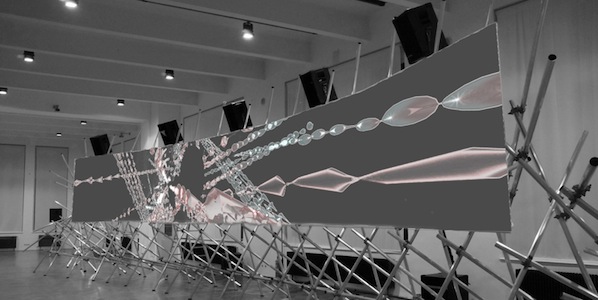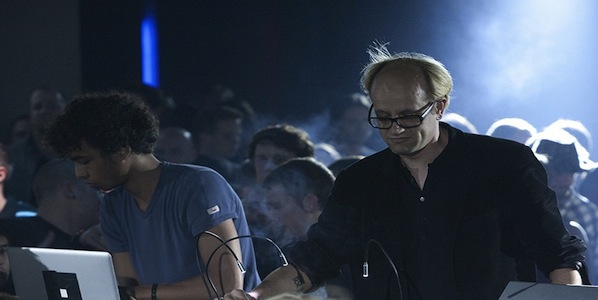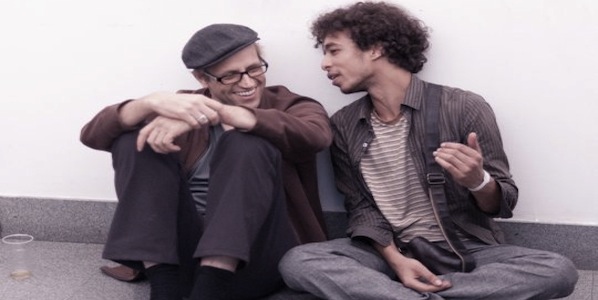



Featured image: Fundamental Forces by Robert Henke and Tarik Barri
In its current state “Fundamental Forces” is a pre-rendered high definition multiple screen projection with surround sound. The visual component is based on Tarik Barri’s ‘Versum’ – a self-programmed computer animation engine. And the auditive component comes from Robert Henke, using MaxMSP, Max4Live and Ableton Live, a software he co-developed. It has been initially commissioned for the RML Cinechamber system which consists of 10 1080p projections and 8 channels of sound (FF00 – FF01). A later version was adapted to work with 5-6 screens and a 5.2 soundsystem. This was used during the sound:frame Festival in Vienna, and it had a highly immersive presence.

When experiencing the work I enjoyed the absence of narrative. Although I noticed some references alluding to concepts based on physics, and basic foundations of the universe. This led me to ask some questions to both artists about their “audiovisual research project”.
Robert Henke is active as composer, AV artist and professor in sound design at the University of Arts in Berlin. As founder and main member of his solo-project “Monolake”, he gained international reputation as one of the leading artists in the field of electronic club music culture. Henke has released more than twenty albums. His performances and installations have been shown and others at the Tate Modern in London, the Centre Pompidou in Paris, the PS1 in New York and the Experimental Media and Performing Arts Center (EMPAC) in Troy. His work “Layering Buddha” received an honorary mention at Ars Electronica in 2007.
Natascha Fuchs: “Fundamental Forces” is presented at sound:frame Festival this year and you worked on it together with Tarik Barri. How your collaboration has started?
Robert Henke: I was looking for Max programmer a few years ago. Tarik replied, but told me that he had no time for that, even if he would like to. However, later he sent me some video stuff he did and I thought that his work could be integrated into Monolake Live. That’s how it all came together.
NF: You call Fundamental Forces ‘an audiovisual research project’. What exactly do you call research? And how much of research involved into your life?
RH: The research part of it is simply the experimentation with the format: what kind of sound can be combined with which of Tarik’s visual ideas and vice versa. We try to find a common language. And since his work does not suggest a common narrative, we also need to come up with our own large scale structures. Where do we start, where do we stop? What kind of timeframes make sense? How can we shape transitions? Questions like this…
NF: You are involved into many different activities.. Is there anything what you like most of all? Music production, performing, visual ideas development, teaching students maybe? What gives you the feeling of ‘life is great and I am satisfied with everything’?
RH: This always changes, but I am most satisfied in moments when my own sense of achievement finds its counterpart in the perception of what I do in public. If I for myself gave a lecture which I felt was really good, and afterwards students come to me and share that notion, – I am happy. If I had a great day in the studio and afterwards play the music to some friends and they like it too, – I am happy. And if things simply do not work out the way I want to, if I have an idea, but every attempt to turn in into sound or visuals does not satisfy me, then I am most frustrated.
NF: You live in Berlin. How does the city and different generations grown up there change together with technology changes? You see many students probably for whom technology is something ready to use now, and it was different at a time when Ableton Live was not yet created..
RH: The biggest transition in general is from a situation that is characterized by a lack of tool in the early 1990s to the total abundance of tools in 2012. The question today is not: how do I do something, but rather: what am I really interested in? All is possible with current technology. Finding your personal language is the biggest challenge these days.
NF: Currently in the interview to Bleep you said that you have so many ideas to explore yourself in the next future. Could you share one of them, what is Robert Henke’s the next?
RH: The biggest project I am working on is a large scale laser and sound installation called ‘Fragile Territories’. It is a challenge in many ways; technically and artistically. I want it to be very good, it is an important work for me, and I still need to do a lot of research. Laser is a very limited media, and in order to create something that is more than a technology demo one needs to invest a lot of time thinking about what exactly to do with it and also find out how to make the best out of the limitations.

Tarik Barri is a Dutch audiovisual composer and software developer. He started programming at the age of seven and has been making electronic music since he was a teenager. After his first official musical releases at the age of twenty one, he quit his studies in biological psychology to pursue the study of music and technology at the Utrecht School of Music and Technology. During this studies he saw how the methods he used to create music could be adapted for the moving image. He programmed his own software to develop new tools for audio-visual performance, composition and data representation.
Natascha Fuchs: You live in the Netherlands, which is famous for successful promoting of media and digital arts/sound. Which Dutch institutions, festivals do you support?
Tarik Barri: I’ve been living in Berlin for a little while now, but definitely living in The Netherlands has been very very good for me to develop my work and my working methods. After I finished school, there was the WWIK, which is a government funding to help new artists develop their work. Also the Netherlands Foundation for Visual Arts, Design and Architecture helped me a lot by giving me a stipend to develop my work. Then there were organisations and festivals like TodaysArt, Sonic Acts and V2 that helped me introduce my work to the general public. Unfortunately many programs are getting cut these days in a new political climate where art in general seems to be regarded a left wing hobby for elitist snobs. Very sad, especially since I don’t agree that ‘art’ in general would be class related or have any specific political color.
NF: You were graduated from Utrecht School of Arts. What exactly did you study there?
TB: Within the Utrecht School of Arts I studied at their School of Music and Technology. And within thát school I graduated in Audio Design. It was the most technical study they had, where I learned about music programming, sound synthesis, acoustics, etc. Especially the programming courses in Max/MSP given by my teacher Marcel Wierckx inspired me to combine music, realtime visuals and programming into one discipline.
NF: What is your participation in collaboration with Monolake?
TB: Within Monolake the roles of Robert Henke and myself are clearly defined: he does the music, I do the visuals. But of course we discuss the visuals and music intensively together and there’s a constant dialog going on between both ourselves as individuals and the works that we produce. This continuous dialog has been of great value for my development in the last couple of years, both artistically and technically.
NF: The artwork which will be presented at sound:frame called ‘audiovisual research project’. What is this continuous research in your life, your aim in it?
TB: Both Robert and I constantly develop our own methods for the creation of music and visuals, and we research the aesthetical results that can be achieved through these methods. Through the combination of sound and visuals, I aim to create a sense of reality. To achieve this I’ve developed software that establishes 3d virtual audiovisual worlds. I then populate these realities with a multitude of objects of various shapes, sizes and other properties. Those objects behave according to laws taken from the real reality. While thus creating a completely new world, with its own sets of objects, elements of what we know can still be recognized within this virtual space. For me this contrast between the new and the known highlights the sense of wonder and possibility that emerges from the space between strict rules and the imagination that tries to defy and transform them. Through a window of strict and rigid laws we enter into infinite, colorful, playful, imaginary worlds.

May / June 2012: Fundamental Forces in Canada, Montreal @ MUTEK Festival
Robert Henke aka Monolake: www.monolake.de
Tarik Barri: www.tarikbarri.nl
sound:frame Festival: www.soundframe.at
(c) Natascha Fuchs is independent expert in cultural projects management and international public relations, graduate of the University of Manchester (Cultural Management) in 2008. She has been living in Vienna, Austria, studying History of Media Arts at the Donau-Universität and collaborating with sound:frame Festival for audio:visual expressions, since her move from Moscow, Russia in 2011. In Russia she was related to MediaArtLab and Media Forum — the special program of the Moscow International Film festival dedicated to media arts, experimental films and digital context with more than 10 years history. As a researcher and practitioner, she works in a variety of topics and participates different international projects focused on media arts, cinema and sound. Columnist and writer for several online magazines.